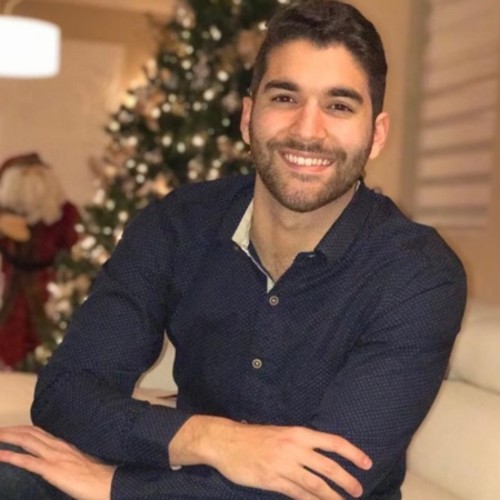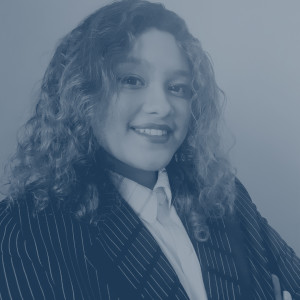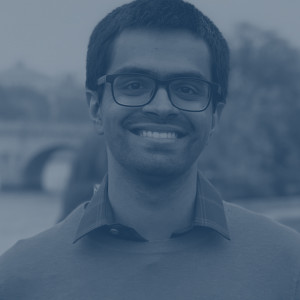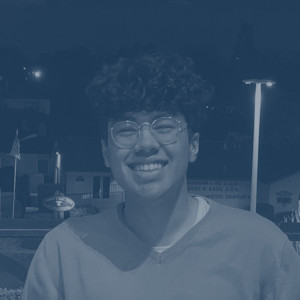Miguel Guardia, 24

Miguel started his journey to coding on a different path. Drawn to finding solutions to complex problems, Miguel was studying mechanical engineering which led him to two co-op experiences. Working in a co-op taught him a lot about himself and about working as a mechanical engineer. He learned the importance of location in the grand scheme of mechanical engineering, often leaving him in remote locations far away from friends and family. Because mechanical engineering work requires in-person activity, the pandemic left a lot of engineers jobless. Feeling cornered, he looked for a new direction and found himself remembering his passion for problem solving, a huge component of coding, and geography was no issue.
Miguel decided to continue with his mechanical engineering major, but took to coding quickly with the help of his sister. At the time, she was completing a software engineering bootcamp, giving him easy access to this new field of interest. Without being enrolled in the bootcamp, Miguel would complete assignments and projects alongside his sister. The amount of work he put in did not go unnoticed, but he was unable to join the camp due to timing. So Miguel started researching other places he could learn and level up his software engineering skills, which is how he discovered MLH. He was accepted into the MLH Fellowship, where he could finally put all of self-taught knowledge to use among a group of peers.
As a mechanical engineer, Miguel would prefer to keep his studies to himself, traveling to the campus only when necessary for tests and assignments. Now, with his mind set on software engineering, he was excited to be present every day for the Fellowship in any way that he could. He felt that he knew what he was getting into, but the program went above and beyond his expectations. Everybody in his pod was friendly, especially his leader and mentor. Because Miguel had done so much work by himself, it was tough at first to bring himself to ask questions for fear of holding back his team. But, thanks to his mentor, he quickly learned the importance of asking questions and messing up in order for projects to later thrive.
With some of his podmates, Miguel built ClipBit. The project began with the idea to take any given video and use speech detection technology to extract the audio to make a text file. But, they later discovered that YouTube already had a caption feature built in. Part of the lesson that his mentor pushed on Miguel was the ability to adapt to what may appear to be mistakes. Just because the idea had been forced to change did not mean that the project was a failure, but an opportunity to improve on the original idea. The team took the captions from YouTube and connected it with a Machine Learning (ML) summarizer to summarize what the video was about. Miguel now had tangible results thanks to the fellowship, allowing him to solve problems in a team-oriented way. He took this team building experience with him to the MLH Orientation Hackathon, his very first hackathon. He programmed with a team for the first time, and spoke in depth with other software engineers. The whole experience was eye-opening, and he can’t wait to take what he’s learned from the hackathon to his workplace.
Like many of us, Miguel didn’t enjoy job applications — they felt like a drag as he searched through the oil and gas industries for mechanical engineering positions. But thanks to his discovery of software engineering, Miguel finds that he’s truly interested and engaged while perusing the job market. He has finally found his niche, one that has and will always keep him intrigued. He makes it a point to apply to companies that he supports or that have products worth getting behind. He found a message to believe in with Housecall Pro, a home service software company. His experience in the MLH Fellowship led to them offering him a job directly following his graduation from the program.
Miguel’s journey has been a non-traditional one, but it’s the experiences he’s gained from his unconventional path that have helped him become the self-starter and team player that he is. His mechanical engineering background challenged him to look further so he landed on software engineering. Diving into the coding world in the middle of a pandemic was undoubtedly a strange time to begin, but it gave Miguel the comfort and satisfaction of bettering himself and finding his passion in a time when he could have remained dormant.
Quick Facts
Miguel Guardia, 24

Miguel started his journey to coding on a different path. Drawn to finding solutions to complex problems, Miguel was studying mechanical engineering which led him to two co-op experiences. Working in a co-op taught him a lot about himself and about working as a mechanical engineer. He learned the importance of location in the grand scheme of mechanical engineering, often leaving him in remote locations far away from friends and family. Because mechanical engineering work requires in-person activity, the pandemic left a lot of engineers jobless. Feeling cornered, he looked for a new direction and found himself remembering his passion for problem solving, a huge component of coding, and geography was no issue.
Miguel decided to continue with his mechanical engineering major, but took to coding quickly with the help of his sister. At the time, she was completing a software engineering bootcamp, giving him easy access to this new field of interest. Without being enrolled in the bootcamp, Miguel would complete assignments and projects alongside his sister. The amount of work he put in did not go unnoticed, but he was unable to join the camp due to timing. So Miguel started researching other places he could learn and level up his software engineering skills, which is how he discovered MLH. He was accepted into the MLH Fellowship, where he could finally put all of self-taught knowledge to use among a group of peers.
As a mechanical engineer, Miguel would prefer to keep his studies to himself, traveling to the campus only when necessary for tests and assignments. Now, with his mind set on software engineering, he was excited to be present every day for the Fellowship in any way that he could. He felt that he knew what he was getting into, but the program went above and beyond his expectations. Everybody in his pod was friendly, especially his leader and mentor. Because Miguel had done so much work by himself, it was tough at first to bring himself to ask questions for fear of holding back his team. But, thanks to his mentor, he quickly learned the importance of asking questions and messing up in order for projects to later thrive.
With some of his podmates, Miguel built ClipBit. The project began with the idea to take any given video and use speech detection technology to extract the audio to make a text file. But, they later discovered that YouTube already had a caption feature built in. Part of the lesson that his mentor pushed on Miguel was the ability to adapt to what may appear to be mistakes. Just because the idea had been forced to change did not mean that the project was a failure, but an opportunity to improve on the original idea. The team took the captions from YouTube and connected it with a Machine Learning (ML) summarizer to summarize what the video was about. Miguel now had tangible results thanks to the fellowship, allowing him to solve problems in a team-oriented way. He took this team building experience with him to the MLH Orientation Hackathon, his very first hackathon. He programmed with a team for the first time, and spoke in depth with other software engineers. The whole experience was eye-opening, and he can’t wait to take what he’s learned from the hackathon to his workplace.
Like many of us, Miguel didn’t enjoy job applications — they felt like a drag as he searched through the oil and gas industries for mechanical engineering positions. But thanks to his discovery of software engineering, Miguel finds that he’s truly interested and engaged while perusing the job market. He has finally found his niche, one that has and will always keep him intrigued. He makes it a point to apply to companies that he supports or that have products worth getting behind. He found a message to believe in with Housecall Pro, a home service software company. His experience in the MLH Fellowship led to them offering him a job directly following his graduation from the program.
Miguel’s journey has been a non-traditional one, but it’s the experiences he’s gained from his unconventional path that have helped him become the self-starter and team player that he is. His mechanical engineering background challenged him to look further so he landed on software engineering. Diving into the coding world in the middle of a pandemic was undoubtedly a strange time to begin, but it gave Miguel the comfort and satisfaction of bettering himself and finding his passion in a time when he could have remained dormant.



